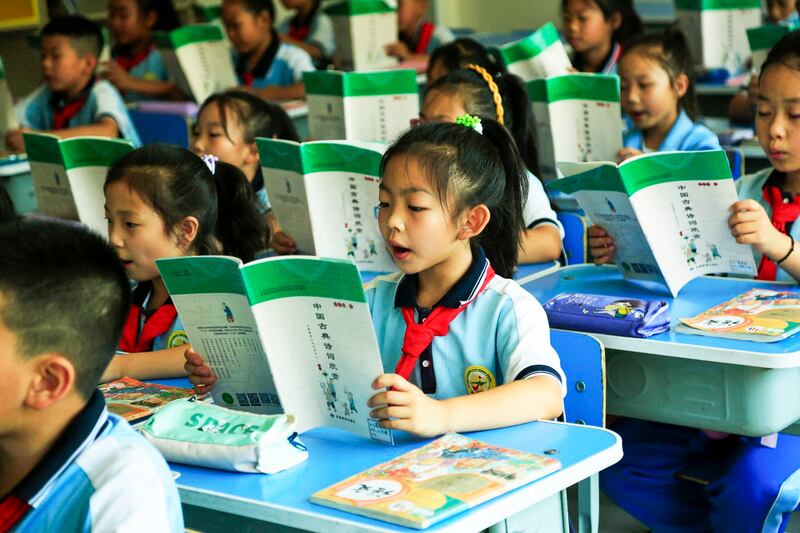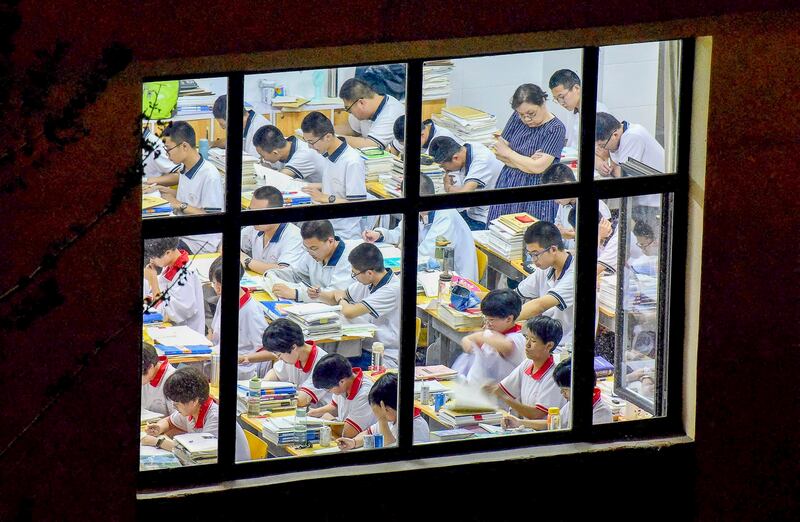Hong Kong schools have been banning books, warning teachers not to express "political" views, training students how to raise the Chinese flag correctly and screening patriotic films, according to online documents that reveal what the city's "national security education" program looks like on the ground.
The ruling Chinese Communist Party is moving to step up its " patriotic education" program in schools, universities and religious institutions across the country, including in Hong Kong, where the program is generally termed "national security education."
Since the start of the current academic year, teachers in more than 1,000 Hong Kong schools have been required to report "potential violations" of the city's security laws to the authorities.
They are also expected to submit reports detailing their efforts to impose "national security education" on staff and students.
Many are posting their reports online, revealing ongoing inspections, surveillance and a growing emphasis on patriotic activities and celebrations of traditional Chinese culture, lauded by President Xi Jinping as part of national pride and rejuvenation.
Authorities at the New Territories Heung Yee Kuk Yuen Long District Secondary School are reminding teachers "not to promote their personal politics, preach distorted values or make remarks that incite [others] in teaching materials," according to the school's annual report to the Education Bureau on its National Security Education program.

Teachers at the school have been warned "not to directly or indirectly encourage or acquiesce in students' participation in any off-campus political activities," according to the report, a copy of which is available on the school's website.
The school has also started inspecting books held in its library and has axed its subscription to Hyread, an online platform offering reading material in Chinese and English to prevent "violations of national security laws," according to its report.
Banned books
The Kowloon Technical College has also been checking its library, and has banned seven books, according to its report for last academic year.
"On March 15-16, 2023, the vice principal, director of reading promotion and the library director inspected the library collection and found a total of seven books containing political propaganda," the report said.
The Christian Alliance Cheng Wing Gee College requires its teachers to upload any teaching materials to the school's intranet for approval before using them in class, while teachers are focusing on "boosting national and ethnic pride" as a natural part of the day-to-day curriculum, according to its report.
Meanwhile, students at the Tai Po Baptist Public School have been attending Chinese national flag-raising ceremonies on designated days to establish "correct values and patriotic feelings."
Several schools said their students trained for and took part in patriotic "flag-raising competitions," as well as a patriotic essay-writing competition with the theme "I Love My Motherland," according to their "National Security Education" reports for the academic year 2022-2023 posted on their own websites.
The reports also reveal a fast-emerging system of sanctions and punishments for speech crimes in Hong Kong's schools.
Students who are deemed to have violated national security laws, which include clauses forbidding public criticism of the Hong Kong and Chinese governments, or any non-critical mention of the pro-democracy movement, will be counseled, punished or have their parents called in, depending on the seriousness of the alleged offense, the reports said.
‘My Country, My People’
Around 40% of publicly funded schools in the city, which on March 23 passed a second national security law, broadening an ongoing crackdown on dissent, have made similar reports public on their websites to date, the Ming Pao newspaper reported.
According to the Hennessy Road Government Primary School's National Security Education report for 2022-2023, the school picked "student ambassadors" to shoot videos to promote China's National Day on Oct. 1, and held a screening of the Chinese patriotic film, "My Country, My People."
English-language schools are no exception, with the government's Chiu Lut Sau Memorial Secondary School in Yuen Long reporting that it will "review the content of the student association's politics platform and the Christmas singing competition repertoire" to filter out content that could run afoul of security laws.

Artist Wu Chun Him, who taught drama in Hong Kong's primary schools for many years, said that means in practice that no negative content about the Chinese government can be allowed in the city's schools, citing the "harm done by the Cultural Revolution" in Mao's China as something that will no longer be spoken about.
"Now they have the invisible hand of criminal liability in the background, no teacher is going to want to teach that stuff and wait to see if they get in trouble," Wu told RFA Cantonese.
"Ultimately, all they can do is learn to sing from the same hymn sheet," he said.
Protecting themselves
Former Hong Kong Examinations and Assessment Authority official Yeung Wing Yu, who now runs the @edulancet Instagram account where he blogs about the city's education system, once attended Hennessy Road primary school, and said he was "shocked" to read its national security education report.
"What was shocking to me was that they're not just putting up display boards at student association activities to inform people about safeguarding national security ... they're also doing it at activities organized by alumni and alumni associations," Yeung said.
He described the Kowloon Technical School report as the most radical. He said the schools are likely publishing these reports to protect themselves.
"The safest thing is to tell everybody how well you are doing something, and make it public," Yeung said. "It's the best form of protection."
"It sends the message that this school is politically safe, so that the government doesn't mess with it if something happens," he said.
He said the recent expansion of Hong Kong's Diploma of Secondary Education to mainland Chinese schools will likely have the effect of repopulating the city with incoming families from elsewhere in China, lured by the promise of an internationally recognized education.
Translated with additional reporting by Luisetta Mudie. Edited by Malcolm Foster.
